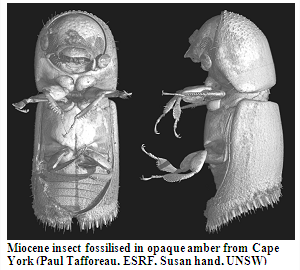
Micro-computed-tomography opens a window on the micro-scale three-dimensional structure of a wide range of samples relevant to the life sciences, materials engineering, palaeontology and geology to name just a few. Synchrotron-based micro-CT featured notably in the recent SRI meeting where its application to palaeontology, including imaging insects in opaque amber and the fossil remains of soft tissue was highlighted in plenary and public lectures by Paul Tafforeau and Kate Trinajstic. Scientists who are already familiar with micro-CT in the lab are now turning to synchrotron micro-CT facilities to access a greater range of capabilities including higher resolution, phase-contrast, elementally sensitive techniques such as K-edge subtraction and high-speed data collection for observing dynamic processes in three-dimensions.
We propose a micro-CT beamline for the Australian Synchrotron which will enable high-speed and high-throughput micro-CT capable of data-collection times of under a second. The field-of-view (FOV) and resolution will range from a few mm FOV at submicron resolution to larger fields of view up to a few cm at ~10 microns resolution. The beamline will support white/pink beam and broad-band monochromatic imaging modes for high-throughput, and narrow-band monochromatic modes for applications such as absorption edge subtraction and high-accuracy quantitative tomography. It will also support phase-contrast imaging modes such as in-line and DEI and will be able to accommodate environmental cells enabling dynamic CT studies of samples that change as a function of temperature, pressure, strain, pH or other modified environmental conditions.
There is already an active micro-CT community in Australia which has come together for two Australian workshops in the last two years. The community is growing due to the increased availability of laboratory micro-CT systems, and researchers are already using synchrotrons overseas for micro-CT studies which they can't accomplish in the lab. Access to a dedicated micro-CT beamline at the Australian Synchrotron would be an enormous boost to micro-CT based research across a wide range of science disciplines.
The community has already indicated strong interest in this beamline proposal with over 90 scientists expressing their support either by joining the mailing list or by contacting us privately. Potential applications from Australian & NZ researchers working in micro-CT include studies of the hierarchical structure of bone, fluids in porous geomaterials, corrosion in metals, fossil insects in amber, analysis of networks in radiolaria, & studies of the effects of medicines & genetics on bone health using animal models. The beamline is envisaged to provide a complementary set of capabilities to the high-energy larger field-of-view capabilities of the IMBL which is the only other beamline capable of full-field CT at the synchrotron. It will focus on applications requiring higher resolution and lower x-ray energies (8-40keV) and will be particularly targeted at high-throughput and dynamic micro-CT applications.
Capabilities
- High throughput micro-CT using white beam or high-bandwidth monochromatic beam.
- Sequential micro-CT studies of samples that change as a function of temperature, pressure, strain etc.
- High-accuracy quantitative monochromatic micro-CT using beam from Si monochromators to remove beam hardening and enable tuning to absorption edges.
- Hi-speed ‘video-rate’ 2D x-ray imaging of dynamic processes.
- Potential phase-contrast imaging modes: in-line, diffraction-enhanced, grating-based
- Topography and tomosynthesis/laminography of larger samples
![]() Download MCT Detailed Report 2011-09 (pdf, 1,700kb)
Download MCT Detailed Report 2011-09 (pdf, 1,700kb)
The members of the MCT Beamline Scoping Group are: Sheridan Mayo (CSIRO), Allan Jones (USyd), Anton Maksimenko (AS), and Karen Siu (AS).
Enquiries may be directed to: Sheridan Mayo
Organisation: X-ray Science and Instrumentation Group, CSIRO Materials Science and Engineering
Phone: +61 (3) 9902 9801
Fax: +61 (3) 9544 1128
Email: Sherry.Mayo@csiro.au
Further Information
- Contact Andrew Peele or Kia Wallwork at asdp@synchrotron.org.au.
